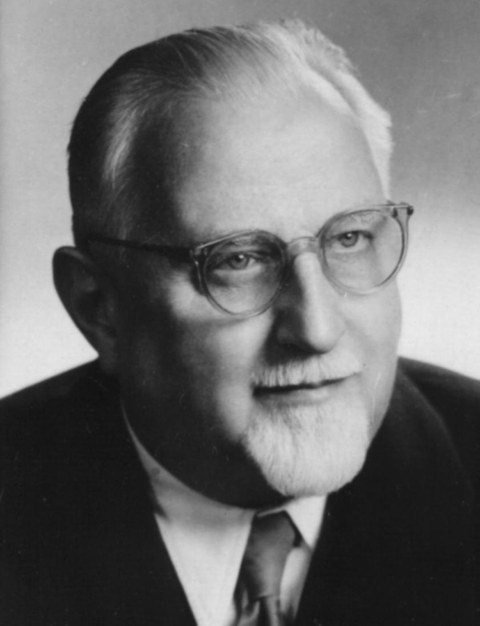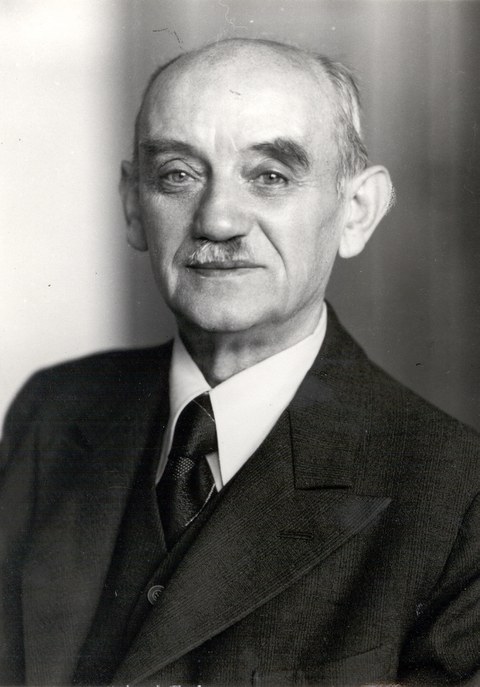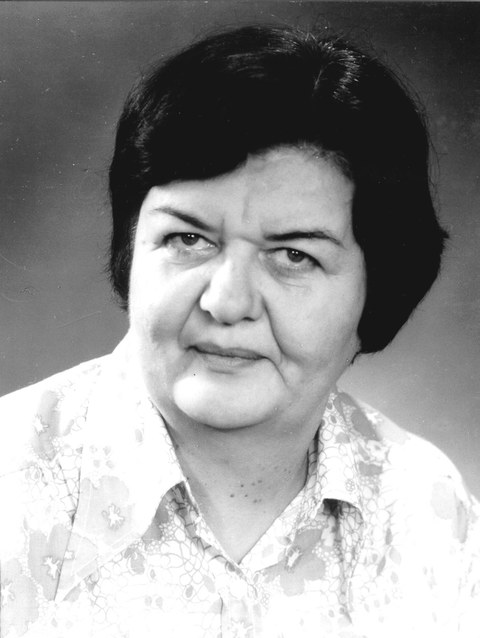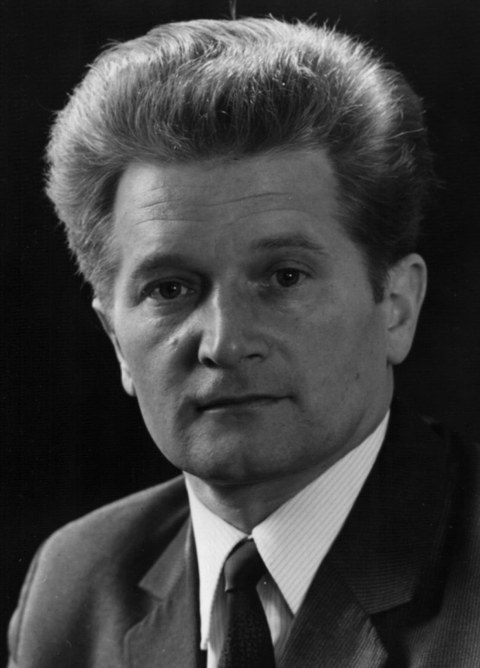Review

Rudolph Zaunick (1893-1967)
As early as the 1920s, the research field of the history of biological sciences was represented in the General Department of the TH Dresden by the science historian Rudolph Zaunick. In September 1945, Richard Woldt, a former functionary of the metalworkers' association and Social Democrat, was appointed Honorary Professor and in November 1945 Full Professor of Social Labour Engineering at the TH Dresden. He had previously resigned from his position as Vice President of the Saxon State Administration. In continuation of his publishing activities in the 1920s, which focused primarily on the working world of technology, the history of technology and political history were very closely linked for Woldt. In addition to social labor studies, Woldt's teaching duties also included the history of the labor movement and the history of technology. In 1948, he offered a compulsory lecture for the first time for graduate industrial teachers. Woldt's intention to place technology in a social context was reflected in the pair of terms industrial economy and workers' issues - the title of one of his lectures.

Richard Woldt (1878-1952)
The three university reforms carried out in the Soviet occupation zone and the GDR not only represented formal turning points, but also had a lasting impact on the structures and profiles of the universities. While the first reform in 1946 was characterized by a policy of counter-privilege, the second reform in 1951 introduced strongly centralistic and ideological elements into the canon of subjects at the TH Dresden. The social work sciences taught by Woldt were marginalized compared to the now newly institutionalized social sciences and the history of technology was removed from the compulsory part of the courses in favour of teaching the basics of Marxism-Leninism. As a result of this development, Woldt sought to establish an Institute of History of Technology and Natural Sciences within the Faculty of Vocational Education and Cultural Studies in 1952. Although his death in August 1952 meant that he was no longer able to take over its leadership, the intention of this Institute remains associated with his name. Initially headed by physicist Alfons Kauffeldt, who came from the Berlin Institute of Medical History, the Institute of History of Technology and Natural Sciences grew in size and equipment over the years. Work on documentation, the establishment of a separate special library and the founding of a Bibliography of the History of Technology (BGT), which was continued by the Saxon State, Regional and University Library as a specialist catalog of the history of technology until 2015, indicated the intention to create a comprehensive material base in Dresden. The closure of the Institute at the end of 1963 was by no means monocausal, even if ideological arguments were decisive with the transformation into a philosophical institute and the beginning methodological focus on a history of productive forces.

Alfons Kauffeldt (1906-1982)
In 1965, when a Chair of Social and Economic History was established at the Faculty of Vocational Education and Cultural Studies and Rolf Sonnemann, who had come from the University of Halle, was appointed, a line of development began that could be continued until 1988. The third university reform of the GDR in 1968 led to a restructuring of the faculties into sections and the Institutes into scientific departments. In addition to the section for Marxism-Leninism, a section for philosophy and cultural studies was created at the Dresden University of Applied Sciences, which was upgraded to a technical university in 1961. Sonnemann's reappointment in 1969 as Professor of Economic History and History of Productive Forces reveals both the nuances of his research profile and the GDR-wide consolidation of the productive forces approach to research in the history of technology. The academic field of the history of productive forces, which worked on the history of productive forces and taught economic history in the 1970s, was expanded in 1978 to include the extremely fruitful problem of the history of the science of technology, both methodologically and materially, until the political change in 1990. The historian of science Gisela Buchheim can be regarded as the spiritus rector of the founding of the Center for the History of Technological Sciences in the academic field of the history of productive forces. Both Buchheim and Sonnemann developed the history of the science of technology in Dresden - partly against the resistance of the advocates of a history of the productive forces under Jürgen and Thomas Kuczynski - into a discipline known beyond the borders of the GDR scientific landscape. On the one hand, the concept of disciplinary genesis advocated by science theorists in the GDR was used and modified as a methodological basis and, on the other, special Soviet work on the specifics of technical sciences. For research planning, the integration of the Center for the History of Technical Sciences into the History of Science working group represented a double benefit: The circle of GDR historians of science, which until then had been determined exclusively by historians of natural sciences and their concepts, was enriched methodologically by the history of technical sciences. The working group for the history of science proved to be more liberal than that for the history of productive forces and thus offered a constructive, unorthodox climate. Although not explicitly committed to a history of science of technology approach, the compendium "Geschichte der Technik" (History of Technology), written in 1978 under Burchard Brentjes, Siegfried Richter and Rolf Sonnemann, was one of the first in the German-speaking world to be based on a modern social science approach to the history of technology.

Gisela Buchheim (1931–1991)
Institutionally, the Center for the History of Technical Sciences made use of a multiplier effect: since 1978, engineering scientists from several technical universities in the GDR were trained in the history of technology in two consecutive four-year aspirant courses. This first generation of historians of science of technology was to return to their home universities and establish institutes for the history of science of technology there under their own responsibility. Teaching and research at the center were interlinked in terms of personnel and time, and the former was only intended for course aspirants. These courses were discontinued in 1987, as there was initially no further demand for them at the Freiberg, Ilmenau, Jena, Karl-Marx-Stadt (Chemnitz), Leipzig, Magdeburg, Merseburg, Rostock and Weimar locations. Despite lively publication activity in the years 1987 to 1990, the center retained an internal status. Teaching activities were limited to lectures to engineering students.

Rolf Sonnemann (1928-2010)
When Sonnemann retired in 1988, Thomas Hänseroth, a student of Sonnemann's, initially acted as acting director of the center. The political change in the GDR in 1989/90 resulted in a further reorganization of university structures. Following the closure of the Philosophy and Cultural Studies section in 1990, it became possible to found an Institute of Philosophy, History of Science, Technology and Economics. This foundation was initially only a renaming of the academic field of History of Productive Forces, but was in no way inconsistent with its previous spectrum. The Chair of this Institute was not filled; the lecturers appointed were Gisela Buchheim, who was already seriously ill, Thomas Hänseroth and Otfried Wagenbreth, who had worked for many years at the Center for the History of Technical Sciences. From the winter semester of 1990, the newly founded Institute offered courses in the history of technology and economics as part of the studium generale for engineering students. After a long absence, the history of technology thus returned to the educational program for engineering students in Dresden, albeit initially only as an optional subject.

Erhaltene Tafel des ehemaligen Instituts
The Faculty of Humanities and Social Sciences at TU Dresden, founded in 1991, offered a new platform, which was also utilized with the founding of the new Institute of History of Technology and Engineering. From 1992 onwards, the range of courses on offer deepened once again, as this was when the training of teacher training and master's degree students in the history of technology began. The appointment of Thomas Hänseroth to the Chair of History of Technology and Science of Technology in 1993 represents the provisional end point of a development that, despite caesuras, identifies the history of technology at TU Dresden as a significant academic discipline. Since 2005, the chair has been part of the Institute of History in the Faculty of Arts, Humanities and Social Science and offered courses for all history degree programs at TU Dresden.
Read more
- Thomas Hänseroth: A founding publication of the history of the science of technology in Germany. Commentary on Gisela Buchheim: Zur Wechselwirkung von Naturwissenschaften und Technikwissenschaften in ihrer historischen Entwicklung (1978), in: NTM. Zeitschrift für Geschichte der Wissenschaften, Technik und Medizin 18 (2010) 3, pp. 409-420. Access via SpringerLink link.springer.com/article/10.1007/s00048-010-0033-2
